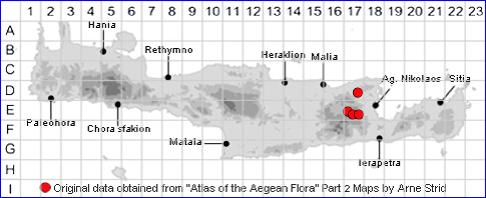SILENE CONICA
Family and Genus:- See- CARYOPHYLLACEAE/Sect. CONOMORPHA
Common Names:- Sand catchfly, Striated catchfly.
Homotypic Synonyms:- Pleconax conica.
Meaning:- Silene (Gr) A name used by the Greek philosopher Theophrastus for
catchfly.
Conica (L) Cone-shaped, conical.
General description:- Short to medium sticky-hairy annual, rather greyish.
Stems:-
1) 15-50cm. Erect, often single-stemmed, occasionally branched from the base,
often covered in sand grains.
Leaves:-
1) Lance-shaped.
2) Cauline, broadly linear.
Flowers:-
1) 4-5 mm; cyme a 5- to 30-flowered. dichasia. Rose-pink or whitish.
2) Calyx, 13-18 mm, cylindrical at anthesis, broadly ovoid and somewhat inflated in
fruit, truncate at the base, with c. 30 conspicuous parallel veins; indumentum
variable but not including long, multicellular eglandular hairs.
3) Petal-claw, not exserted.
4) Petal-limb, 3-5 mm. comparatively narrow, bifid. with a broad apical sinus, pink,
rarely white.
Fruit:-
1) Capsule, 7-12 mm, pyriform, included in calyx.
2) Seeds, 0.7-1.0 mm, grey, with low, obtuse dorsal tubercles.
Key features:-
1) Capsule, 7-12 mm.
2) Seeds, 1 mm or less, pruinose.
3) Calyx, shortly pubescent; 30-veined.
4) Lowe,r leaves acute.
5) Stems, erect.
Habitat:- Sandy and gravelly places, dry grassy meadows, deciduous scrub, field
margins. 0-1300 m.
Distribution:- Mainland Greece, Ionian Islands. Widespread in Europe and SW
Asia. Rare on Crete currently known only from the Dikti mountains.
Flowering time:- Apr-June.
Photos by:- Steve Lenton
SPECIES DESCRIPTION
